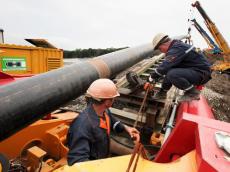Today.Az » Analytics » TANAP becomes major gas link
03 December 2014 [13:14] - Today.Az

/AzerNews/ By Gulgiz Dadashova The Trans-Anatolian Pipeline project -- one of important components of the Southern Gas Corridor designed to pipe natural gas from the Shah Deniz field of Azerbaijan to Italy, offering the European Union an alternative to Russian gas supplies -- can attract one more major player of energy market in face of Russia’s Gazprom. TANAP, developed by SOCAR in collaboration with Turkish Botas and the energy company TPAO, will deliver Shah Deniz gas to the Turkish-Greek border from eastern Turkey. This gas pipeline project is recognized as a step towards ensuring the energy security of the European countries, as well as Turkey. TANAP that is currently under construction may be used by Russia’s natural gas giant Gazprom for the supply of Russian gas to the south of Europe, instead of the South Stream pipeline, deputy head of the National Energy Security Fund Aleksei Grivach told TASS. Grivach said the EU-supported TANAP with a design capacity to transport 30 billion cubic meters of gas per year envisages the Azerbaijani gas supply to European countries. “Azerbaijan is unlikely to be able to supply more than 15 billion cubic meters a year, so Gazprom has the right to count on the remaining capacity in the pipe. But anything can be expected from the EU,” Grivach said. The 3,500-kilometer South Gas Corridor that would finally end Europe’s dependence on a single pipeline started with the go-ahead to the South Caucasus Pipeline Expansion, which will connect the Sangachal terminal with eastern Turkey through Georgia. It will link up with the SOCAR-led TANAP to be connected with a third pipeline TAP on the Turkish-Greek border. TANAP construction is due to be completed in 2018 and TAP in 2020 with first gas deliveries to Europe planned in the same year. The cost of the work on all four elements of the Southern Gas Corridor is estimated at almost $50 billion, according to the preliminary data. Russia is not the sole energy supplier that can join TANAP, as earlier Turkmenistan has signed an outline deal with Turkey to diversify exports of its gas to world markets to supply gas to the proposed TANAP. To join the pipeline Turkmenistan will have to lay another pipeline across the Caspian Sea. Russia which does not look positive over Turkmenistan's plans to sell its gas to Europe, has voiced concerns that a possible gas pipeline to be laid in the shallow Caspian Sea could harm the ecology of the sea. There is also a second option -- a pipeline across northern Iran. A compromise between the Western nations and Iran over Tehran's nuclear development program could allow Iran to participate in the transit of Turkmen gas to Turkey. Furthermore, Gazprom and Turkish pipeline company Boru Hatlari Ile Petrol Tasima AS plan to build a pipeline capable of shipping 63 billion cubic meters a year from Russia to Turkey. The infrastructure built in preparation for South Stream will be used for this pipe, Gazprom’s Miller said. About 20 percent of that capacity, 14 billion cubic meters exactly, will go to Turkey, Miller said. The rest will be shipped through Turkey’s pipeline network to the Balkans, he said.
This will enable Russia to serve increased demand in Turkey and in the Balkans initially while avoiding Ukraine transit risk, and then expand capacity once the route has been established. Experts argue that this will be an expensive project at a time when Russia’s finances are severely constrained. Although these agreements caused concerns that it can harm the TANAP project realization, the fact is that the supply and planned volumes are already under contract and Turkey has voiced its commitment to the project. The agreements reached between Russia and Turkey on gas supply will not affect the implementation of TANAP project, CNN Turk TV channel quoted Turkish Minister of Energy and Natural Resources Taner Yildiz as saying on December 2. Turkey attaches great importance to the implementation of projects of TANAP and TAP pipelines the sections of which pass through the territory of the republic. “Turkey plays an important role in these projects. They are implemented to meet the fuel needs that Europe will have by 2035,” Turkish Energy Minister Taner Yildiz said previously.
|